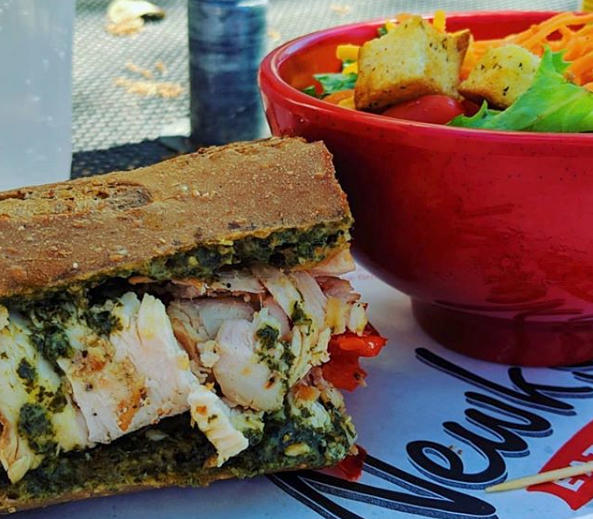
Courtney D Smith – Newk’s Eatery
As the VP of off-premise sales at Newk’s Eatery, Courtney Smith and her team are tasked with helping the 127-unit restaurant brand grow delivery and catering sales, while also helping franchisees make sense of a quickly morphing industry. Their work entails negotiating with third-party delivery providers over fees and data, sussing out the cause of the occasional negative guest complaint Yelp review and making sure delivery providers literally answer the call when the company or one of its franchisees have concerns.
Having done this with other restaurant groups, including La Madeleine and Corner Bakery Cafe, Smith clearly enjoys setting the standards and then staying vigilant to ensure they are met, whether it’s an important catering order or a single customer wondering what’s taking their chicken parmesan sliders so long.
For Newk’s, based in Jackson, Mississippi with major operations in Dallas, third-party delivery is only 3.5 percent of the chain’s total volume. Catering makes up a much more significant 11 percent of its sales. Keeping these gears turning, while working to increase those numbers, Smith spends the vast majority of her time driving and flying around throughout the brand’s turf, which is primarily anchored in the Southeast but as far afield as Colorado and Maryland.
While Smith oversees catering, a significant portion of her weekly time includes working with the cross-functional team that runs point on delivery, including Matt Wilson, Newk’s franchise business consultant and Adam Karveller, the company’s VP of IT. She asserts that maintaining positive relationships is the key, but negotiations with delivery can occasionally get contentious. Her biggest pieces of advice for others negotiating delivery contracts is twofold: transparency and not budging on must-have brand standards, whether that’s a certain fee or the handling of customer data.
For DoorDash, one of Newk’s largest delivery partners, Smith said she, Wilson and Karveller’s ongoing work involves a large amount of back-and-forth to cover a wide variety of ongoing topics. That includes helping franchisees focus on their business at hand and not having them manage that relationship on their own. “I think we’re challenging them in a different way, which is good versus some other brands that might let [providers] deal directly with the franchisees,” she said
Giving a hypothetical example, Smith said that all delivery providers promise flawless execution and integration, but the team pays close attention to how that translates when issues arise, like a failed order or compromised guest experience.
On the positive side, their struggles–be it research, negotiations or newfound best practices–are immediately spread throughout the breadth of company- and franchisee-owned stores so everyone is up to speed, rather than navigating these waters on their own.
“We’re unique with the fact that we offer so much support to our franchisee family,” Smith said of sharing her experiences with franchisees. “We are all one family, so all of our resources are very fluid and shared.”
Asked about concerns as delivery becomes a greater part of the restaurant business, Smith said data sharing rises to “really concerning,” along with recent chatter about Grubhub making new restaurant websites that, according to some reports, their owners and employees weren’t aware of. Grub CEO Matt Maloney has strongly refuted those claims.
“Things like that are concerning, because if and when that [delivery] bubble bursts or it goes down, then that guest might think they went out of business, for example, or how are they going to find you again if they’ve already formed this relationship with what they thought was you in the first place,” Smith said.
At the store level, franchisees tend to have the most concerns related to reconciling the numbers, which can be especially troublesome when using more than a few third-party delivery partners. Most franchisees, she noted, aren’t large enough to support a dedicated accounting person salesperson or catering manager who can help with validating monthly third-party statements.
To that end, Newk’s has a partnership with Olo which integrates several third parties with Aloha, the brand’s point of sale system. The partnership’s goal is reducing the amount of franchisee busywork, while also making it easier to track what’s working well for meals heading outside of the restaurant.
Smith noted something as obvious to a catering veteran like on-time delivery, proper branding and best-possible food packaging can make or break a location’s catering business, which is especially critical as that 11 percent figure undoubtedly moves higher in the coming years.
While most restaurant operators are leery of starting a new self-delivery program given the costs, liability risks and difficulties in hiring reliable drivers, Newk’s remains intrigued by the idea and Smith suggested owning the customer data as well as the customer experience is appealing and might be worth the challenges in the future.
For restaurant brands looking to get into delivery or change up their current off-premises setup, Smith recommends considering both local and national delivery providers, and starting the relationship by being transparent about expectations–and always following up to ensure those are met after signing a deal.
“If a third party is not going to deliver what your needs are and partner with you, then you shouldn’t even spend time on the relationship in my opinion,” she added. “Transparency is valued, and I don’t think I’m being gullible by saying that. We have some results showing that, whether it’s in my past life [or at Newk’s], being transparent and not bending from your brand standards and expectations has proved beneficial.”


